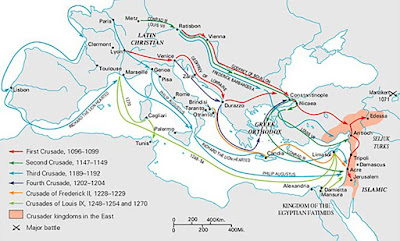Hugh le Despenser the Younger was a few years younger than Edward. Through no effort on his own part, he became extremely wealthy and powerful. The young king—who was known for treating friends and favorites well—gave him estates and castles. His marriage to Eleanor de Clare in summer of 1306 was partially arranged because her grandfather, Edward I, owed Hugh's father 2000 marks. The debt was considered paid by his marriage into a wealthy noble family. Since his wife was also niece of the new king, Hugh was even closer to the royal family.
Then her brother was killed in 1314 at the Battle of Bannockburn. Her brother was Gilbert, 8th Earl of Gloucester, and through Eleanor Hugh inherited one-third of the Gloucester estates. Landless when first knighted, in a few years he became one of the wealthiest knights in England.
A few years after Gaveston's death, Edward elevated Hugh to the important position of chamberlain. The older barons saw this as yet another instance of Edward forsaking them for younger and less suitable councillors.
Hugh was not careful with his authority, alienating Edward's queen, Isabella of France. He also vowed revenge on Roger Mortimer, whom Queen Isabella took into her confidence (and perhaps her bed), because Mortimer's grandfather had killed Hugh's grandfather. Hugh also was known to seize lands that were not his own, and cheating others of their properties. In August of 1321, the barons forced Hugh and his father, Hugh le Despenser the Elder, into exile. The Vita Edwardi Secundi ("Life of Edward the Second"), covering the years of Edward's reign up to 1326, says the Younger became a pirate in the English Channel during this time, "a sea monster, lying in wait for merchants as they crossed the sea."
Edward recalled the Despensers from exile, and they and their forces helped him to put down a rebellion, capture Mortimer, and execute one of Edward's harshest critics, Lancaster. The wheel of fortune turns, however, and there was no long and contented life ahead of Hugh. For details of his death, you will have to come back tomorrow.





